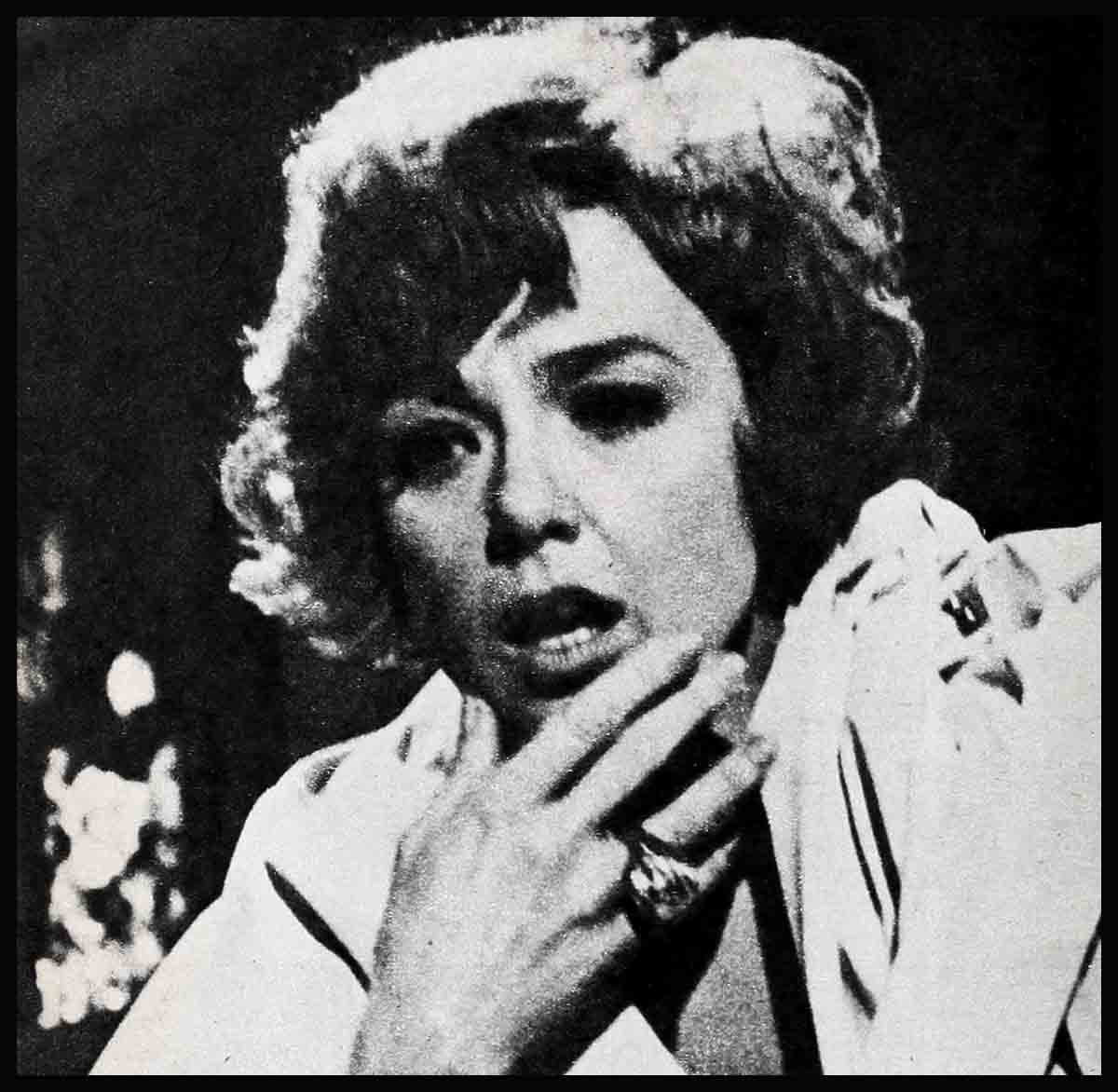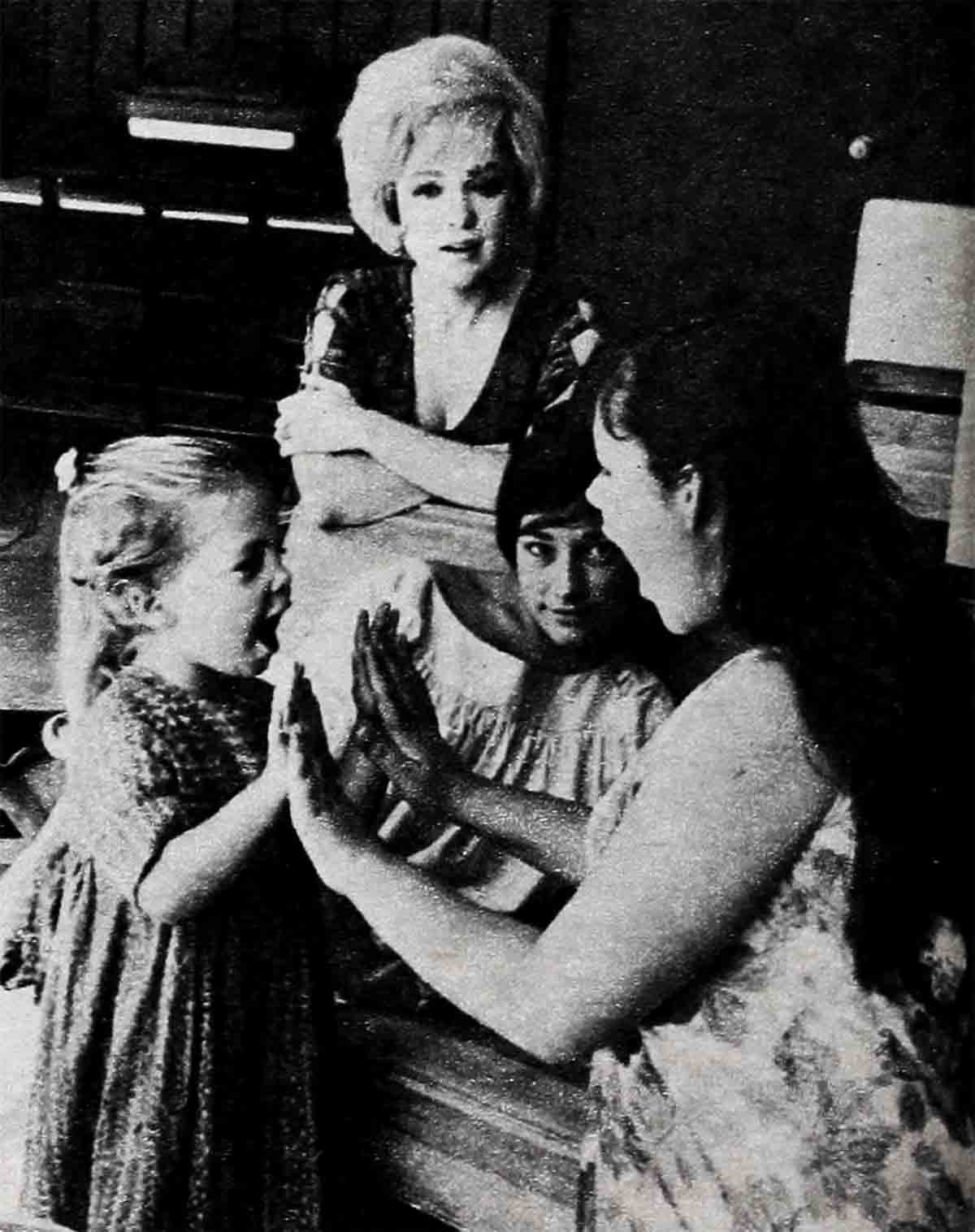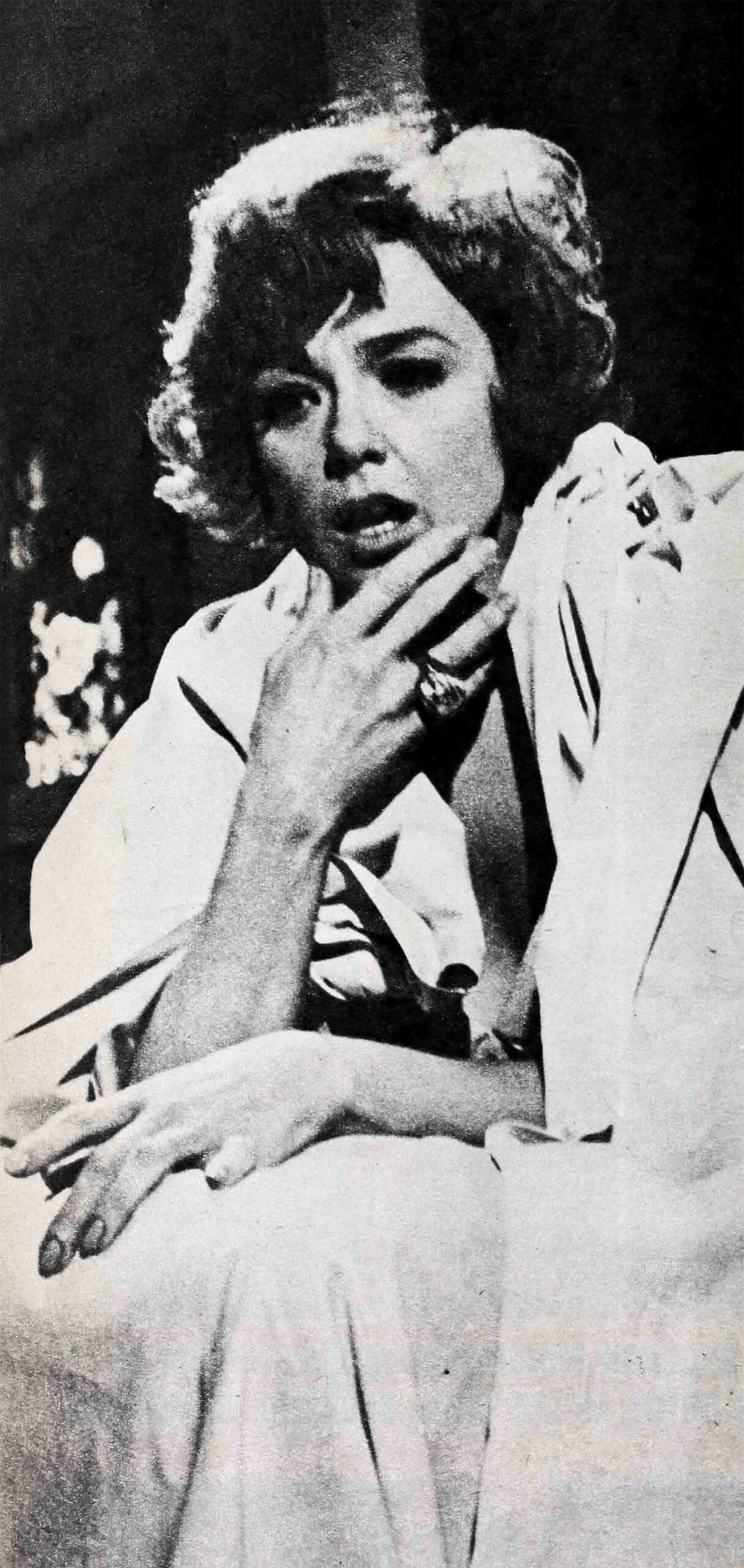
Edie Adams’ Courageous Story: “The Eight Strangers Who Kept Me From Dying”
Edie Adams is known as a singer. She’s known as a comedienne. And she’s been known as a wife and mother. The one thing she doesn’t want is to be known as “The Widow Kovacs.”
As Edie said recently, “Listen, ever since I signed to do eight specials for ABC-TV, I decided it’s for sure I didn’t want people clucking, ‘Ooooohh, poor, sad Edie. We’ve gotta watch her to see how the poor, pathetic thing is doing. How she’s managing to bear up through this terrible tragedy.’ Let’s face it, if that’s all they’re looking for, once they’ve seen it and me, they won’t tune in again. Right? The public won’t buy sob-sister stuff on a long-term scale. They’ll only buy a carefree, gay, happy, glamorous image. And even if it kills me, that’s what I’m going to give them.”
Courageous words, spirited words. But it took eight men, strangers to her, to bring Edie Adams to this decision.
For she had been too distraught to care about life ever since that rainy night last January, when the car her husband Ernie Kovacs was driving skidded into a pole, Wiling him instantly. For months after, Edie “wandered around all alone aimlessly. I was beaten. I was negative. I cried. I moped. I felt so sorry for myself all the time. I wouldn’t even go near his den for five months. I wouldn’t go out in company no matter who called. I was being forced into bankruptcy to pay Ernie’s debts, but I just would not fight back. Then one day eight men, total strangers—I’d never even seen any of them before—sat in my living room and began directing my whole life for me. They began cutting us up. I listened numbly while they coldly talked about taking away my house and my furniture. Then they decided they’d sell whatever other assets I had left. At one point I remember asking meekly could the kids just keep a few articles that were so precious to them. Like, for instance, one horse which they loved so dearly.
“One of the men answered, ‘Well, we really don’t as a rule like to make children unhappy, but . . .’ This triggered me. It was like a cold shower when it got through to me that they were about to nail up the door. Suddenly, I thought, ‘Hey, whoa. This is negative. Negative! My God, I’m taking away the only security the kids have left.’
“Then I rebelled. I turned into a tiger. I suddenly was furious and I shouted. ‘Now, you just wait a minute there. Just hold it one little old minute. Don’t you dare sell anything. Don’t do anything. Give me time.’ So they patted my hand and left.
“Maybe it’s my Pennsylvania Dutch background. I don’t know, but I’ve always been good in a crisis. I really have. I suddenly reared up and I’ve been going ever since. Or trying to, anyway . . .”

Glamorous tiger
When Miss Edie Adams arrived at the restaurant to meet me, she out-Dietrich’d Marlene. Every ounce oozed pure glamour. She was positively smashing. She sported a sable coat. Full length, yet! She wore dark glasses and tons of gold jewelry. Her lush brows were penciled up to here, her blond hair was plumped out to there, and, true to Big Star tradition, she was A) exactly one hour late and B) a “hairdresser dropper.”
“Sorry I’m late,” she apologized. “I overslept. I guess it must he a reaction to . . . everything. And then, of course, I had to go to Kenneth to have my hair done. He did me at his apartment. I tell you, if Kenneth hadn’t telephoned me, I’d probably still be asleep.
“He did my hair specially last night, too, you know, because I had a date to go to Lincoln Center and I wanted to look well. He also did Mrs. Kennedy last night. He’s the chicest hairdresser in town. He was dining out, so he combed me in white tie and tails.”
And what’s with this full-scale glamour bit?
“If you really want to know, it’s because I need it,” sighed Edie. “It’s pure and simple. I need it for showbusiness and I need showbusiness for therapy and money. I had a great teacher in that department. Ernie was a great one for believing that if you’re a star you’ve got to dress the part even if you haven’t got it. And you’ve got to put on a big splash and look gay and prosperous even if you’re not. Well, honey, that’s one phase of this business I’ve learned well. If I’m now living the life of a movie star, I’ve got to look like one whenever I’m in public. And that means spending a lot of time on myself. Going to the hairdresser every single time I’m going to be seen. All this jazz is part of the job.”
Part of the job, too, has been getting herself an agent and a manager and a public relations man and a lawyer and taking the tiger by the tail. She cut her second Decca album called, “Through These Swingin’ Doors.” Then she made a couple of TV Specs and won a couple of awards for them. She made a movie, “It’s A Mad, Mad, Etc., Etc. World.” She made a second movie in England. She’s got another baker’s dozen piled up waiting. She’s already turned down six Broadway shows (“Because I can’t afford to make so little money”) and will this year earn roughly in the neighborhood of $200,000 which, even when you smooth it out by Hollywood standards, is a pretty classy neighborhood.
Edie’s main problem is trying to be the man in the family. She finds the going rough. Her husband’s method of including his wife in things was to give her lengthy legal papers to sign. She’d sign them blindly and two years later discover she’d been named vice president of some corporation she didn’t even know existed. Ernie kept no files. No records. Yet he was the sole guardian of their financial empire. He gave her a checkbook which had no total. Edie never knew from nothin’.
Today, suddenly, she’s not only the mother but also the father of three girls: Betty, Kippei (Kovacs’ daughters by his first marriage) and her own little Mia. Suddenly a whole family looks to her for all decisions. She’s the sole breadwinner. The responsibilities of several human lives rest on her shoulders.
Nowadays as Edie goes, so goes a whole family. For her the really frightening worry isn’t in being bankrupt financially, but instead in being bankrupt emotionally.

Everybody’s entitled to Edie
“Let me put it this way,” she said softly, “I have to be many things to many people, particularly in my home when I’m a general mother superior and a few other things besides. Everybody makes demands on my time and everybody’s entitled to it. But there’s just not enough of me to go around.
“When you’re used to being a part of somebody else with no responsibilities whatever and then to find you’re carrying the whole bundle, it’s hard. And down deep I have that constant worry that the rock is not really a rock. I have a feeling that one day I’m going to do a slow take, but if I fall apart so will the whole family. I mustn’t think negatively for two seconds. If I do, it’s like falling into quicksand. I find it’s very tough for me to be a man. I like being a girl. I like belonging to somebody. I like having that somebody take care of me.”
That’s one of the reasons Edie never pushed her career after they were married. She admits that there is the probability she could have been a real big star before. This is something they fought about a great deal before their marriage. They’d have been Mr. & Mrs. a full three years earlier if Edie hadn’t been so career-minded and if this subject hadn’t caused so much argument between them. However, once they tied the knot, she realized she was “playing with human lives now” and that she’d already “passed the point of no return.” She realized there can be only one leader to a household and with her, it was always Ernie first. “That’s why I gave up trying to push myself,” she smiled wanly. “I couldn’t fly around the country and still have Ernie—and he was my whole life.”
“Before plunging back into showbusiness even occurred to me,” said Edie, toying with a cup of coffee, “I enrolled in UCLA. I took a course in Advance Federal Tax Accounting. See, ever since Ernie . . . er . . . since last January . . . I’ve had to rearrange everything financially. We’d been living on 9 per cent. I figured if anybody has the knowhow to be in a 91 per cent bracket, he should have enough knowhow to rearrange himself hack into the 51 per cent bracket.”
Edie Kovacs has been betwixt headlines for the past year and a half. What goes on in her seventeen-room home in Beverly Hills or her little one and a half room hideaway on lower Fifth Avenue, nobody knows. But on the surface, she appears calm, cool and like everything’s coming up roses. About that front-paged legal battle early this year, triggered by her mother-in-law’s charge that she’s mismanaged Ernie’s estate, she even cracked, “That’s last week’s headache!”
And then there’s her earlier court battles, like the one where she fought for custody of her stepdaughters. When you ask about the first Mrs. Kovacs’ charge that the children were being raised in that “fancy Hollywood manner,” the second Mrs. Kovacs makes a sound that’s a ladylike version of a Bronx cheer.
“My foot!” snorted Edie. “Those poor babies of mine have had so much grief. Look, maybe I’ve had troubles, but I straighten out fast when I think about those kids. They’re only in their early teens and yet Betty and Kippei have already had a very rough life. To appear in court and hear yourself called ‘fat’ and ‘overweight’ because it’s the other side’s way of trying to prove you’re ‘tense’ and ‘neurotic’ as a result of the life you’ve been leading, and then to have to say things against your own mother is a very traumatic thing.
“And, listen, I don’t intend to say anything about their mother, but all I know is that first she sued for $500,000 and second she wanted the kids.
“These girls are my life. I’ve raised them since they were babies. They’re my children and I’m their mother.
“The girls get three dollars a week now. And that’s it. I’m putting aside a trust fund for them, but naturally we had to make a gigantic reshuffling job financially. Ernie used to spoil them so much. He bought them expensive presents. He never said no regardless of how much they wanted. It worried me, but all I could do was complain mildly and hope he knew what he was doing. Now there’s no more getting extra money when they want it. No more charging unlimitedly at department stores. As a result they’ve learned to buy far more wisely. They’ve become so great about clothes. The other day when I wanted to buy them something, Kippei said, ‘No, Mother, it’s too much money.’
“I simply sat them down and told them everything. Told them the truth that we just didn’t have it anymore. They’re brilliant, these kids. Their IQ is so fantastic that it’s scary. They understood that we just can’t afford things like we used to.”
Discipline is difficult
The big problem, though, is the guilt. Warmhearted Edie knows they need discipline. She knows all children require it. She knows that they actually want it. It gives them a feeling of security and direction, but it’s killing her to do it.
“The hardest thing for me to do,” she explains slowly, “is to punish the kids. It’s so much easier to quick give them a dollar if you see one tear and say, ‘Here. Go get an ice cream cone!’ But that’s buying your way.
“Little by little I’m trying to say no to them without feeling guilty. Right after Ernie died I couldn’t deny them anything. I didn’t realize that I was doing the children a disservice. They have to be told no. They have to be guided. I can’t tell you what a difference it’s made in our house. Betty made the California Scholastic Roll last June, something she never achieved before.
“I explained to them that I was really doing this for their sakes and they said, ‘Yes, Mommy, we know.’ For instance, our housekeeper used to straighten up their room four and five times a day. Suddenly I decided no more of this coddling. I announced they’d have to straighten up themselves from now on. Well, twice they were embarrassed when they invited friends over and the room wasn’t made up. Now they know. They’ve even taken pride in decorating their own quarters. Of course, just because I put my foot down doesn’t mean they don’t goof . . . they do. And they do it again. And maybe another time. But that’s it.
“There’s no doubt that it murders me, because I get suffused with guilt. But now if I tell Betty or Kippei it’s too late to watch TV, they can’t watch. That’s all there is to it. No matter how they howl and scream, that’s it! And this new responsibility has taught them the value of money. They recently saved up to buy me a blouse. It was the first time they didn’t charge it. I’ll never forget it. And neither will they. It’s the most precious gift I’ve ever had in my life. This learning to save up if they want something special is good for them. It’s character-building. Let them learn the hard way.”
That’s how Edie learned. The hard way. “As a child,” she says, “we had no money but we sure had a lot of pride. That’s why when this . . . thing . . . hit me, maybe I had no money, but I sure had a lot of pride. So I jumped back into showbusiness with both feet.”
So, from the ashes of her biggest personal tragedy, grew the beginning of her biggest professional triumphs. Edie doesn’t quite know what will happen in the future, whether she’ll “toe in without Ernie.” She only knows that she doesn’t want anybody to ever say about her, “There goes ‘Young Widder Brown’ . . . the poor thing.”
THE END
—BY CINDY ADAMS
See Edie in “It’s a Mad, Mad, Mad, Mad World,” UA; “Love With a Proper Stranger,” Par.; “Under the Yum Yum Tree,” Col.
It is a quote. PHOTOPLAY MAGAZINE NOVEMBER 1963





No Comments